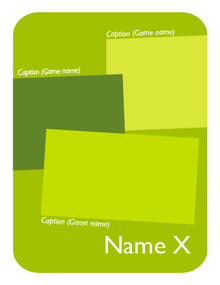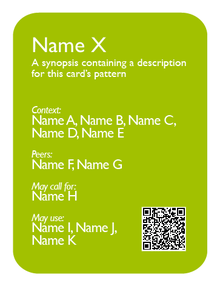|
|
| Line 1: |
Line 1: |
| | {{Card | | {{Card |
| − | | v10rel-tag1=Context:<br>
| |
| − | | v10rel1=[[Consequent Sound]], [[Engagement]], [[Emotional Script]]<br>
| |
| − | | v10rel-tag2=Includes:<br>
| |
| − | | v10rel2=[[Sing to Act]], [[Play the Beat]], [[Sound Decoys]], [[Echolocation]], [[Address Others]]<br>
| |
| − | | v10rel-tag3=Contrasts with:<br>
| |
| − | | v10rel3=[[Sonic Weapon]]<br>
| |
| − | | v10rel-tag4=May imply:<br>
| |
| − | | v10rel4=[[Sound Input]]<br>
| |
| − | | v20rel-tag1=Context:<br>
| |
| − | | v20rel1=[[Consequent Sound]], [[Emotional Script]]<br>
| |
| − | | v20rel-tag2=Relates to:<br>
| |
| − | | v20rel2=[[Engagement]]<br>
| |
| − | | v20rel-tag3=Includes:<br>
| |
| − | | v20rel3=[[Sing to Act]], [[Sound Decoys]]<br>
| |
| − | | v20rel-tag4=Contrasts with:<br>
| |
| − | | v20rel4=[[Sonic Weapon]]<br>
| |
| − | | v20rel-tag5=May imply:<br>
| |
| − | | v20rel5=[[Sound Input]]<br>
| |
| | | v20rel-tag5=xxxxxxxxxxxx:<br> | | | v20rel-tag5=xxxxxxxxxxxx:<br> |
| | | v20rel5=[[R-A-E-D Iterations]], [[Cutscenes]], [[Window of Opportunity]], [[Music]], [[Contextual Music]], [[Achievement]], [[Failure]], [[Grunts]], [[Ouch!]], [[Imminent Death]], [[Trance]], [[Entrainment]], [[...]]<br> | | | v20rel5=[[R-A-E-D Iterations]], [[Cutscenes]], [[Window of Opportunity]], [[Music]], [[Contextual Music]], [[Achievement]], [[Failure]], [[Grunts]], [[Ouch!]], [[Imminent Death]], [[Trance]], [[Entrainment]], [[...]]<br> |
| − | | revisions =Introduced in version 1.0
| |
| − | | description =
| |
| − | In a moment when so many games tend towards belligerent narratives, it is relevant to think of audio as a creativity opportunity, also to come up with ideas that offer alternatives to those types of conflict.
| |
| − | | additional =
| |
| − | * Nature provides many insightful examples of the use of sound to address conflicts, instead of actual physical confrontation, namely through the evaluation of the other party’s potential. The ability to perform sound – loud, long, accurate, ... – is many times an indicator of potential – health, size, maturity, ... Examples include: passerine birds singing to dispute territory, dogs barking, etc.
| |
| − | :[pending: references to some interesting resources in this matter. e.g.: David Attenborough "the winner is the one who sings the longest" (something like that)].
| |
| − | | external =
| |
| − | * ancient rituals of confrontation through vocalizations
| |
| − | ** Baraka 12:29 (chapter 4)
| |
| − | | examples=
| |
| − | | ex1=<mt p="Music" g="LocoRoco" altg="LocoRoco" i="2" w="{{R16by9W}}" h="{{R16by9H}}">LocoRoco offers a rich and delightful experience with no conflict other than avoiding to be bitten by the Moja</mt>
| |
| − | | ex5=<mt p="MakeSoundNotWar" g="Mini Ninjas" w="{{R5by4W}}" h="{{R5by4H}}"></mt>
| |
| − | | ex3=<mt p="MakeSoundNotWar" g="Aquaria" h="200"></mt>
| |
| − | | ex4=<mt p="MakeSoundNotWar" g="Spore" i=2 w="{{R4by3W}}" h="{{R4by3H}}"></mt>
| |
| − | | ex2=<mt p="MakeSoundNotWar" g="Ocarina Of Time" altg="Ocarina of Time" w="{{R4by3W}}" h="{{R4by3H}}">the Big Boss of the Gorons is "defeated" not by force but by getting pleased with the playing of a particular song. This circumstance provides an interesting twist in the [[Emotional Script]]</mt>
| |
| | }} | | }} |

